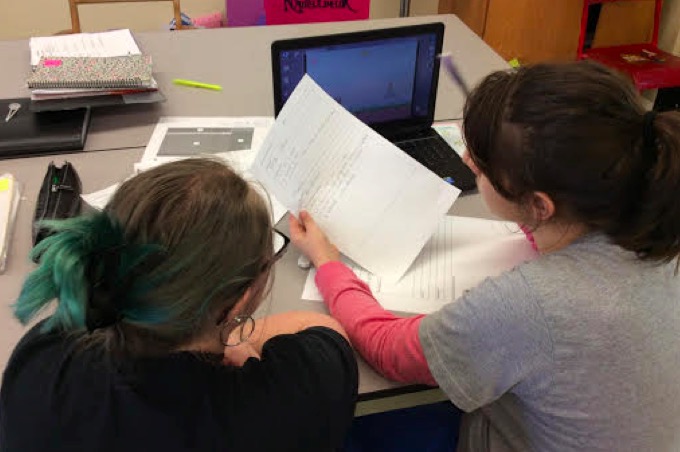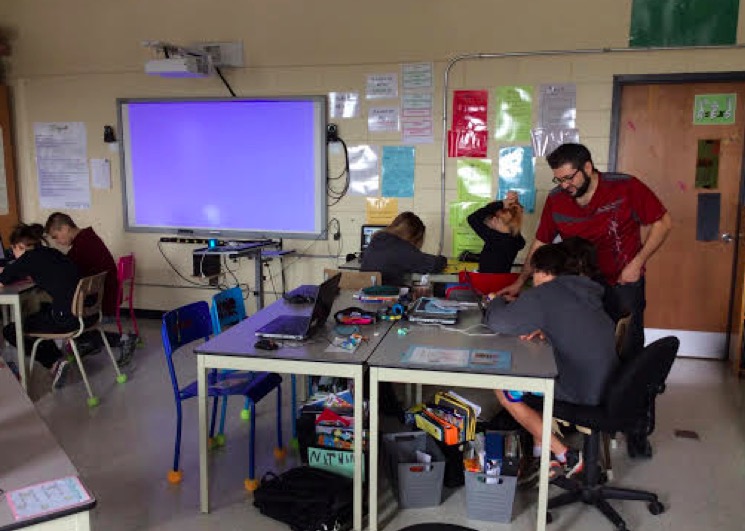La classe de Mme Nancy Lizotte, enseignante en adaptation scolaire auprès de jeunes de 12 à 14 ans dans une classe de cheminement continu à la Polyvalente Robert-Ouimet d’Acton Vale, a eu la chance de participer à un projet innovateur d’initiation à la conception de jeux vidéo.
Grâce à la collaboration d’une ressource externe, M. Gilles Gauthier, directeur informatique, la classe de Mme Lizotte a pu vivre une expérience d’apprentissage motivante. Ses élèves ont participé à 13 rencontres en classe qui se sont déroulées au printemps 2017.
Objectifs des ateliers
L’objectif principal de ces rencontres était d’initier les jeunes à l’univers du jeu vidéo et à toutes ses facettes, mais aussi de leur permettre de développer de nouvelles compétences en informatique, de leur donner le goût d’apprendre, de réveiller leur passion, de prévenir le décrochage scolaire tout en favorisant leur estime personnelle.
De manière plus précise, les ateliers ont permis aux élèves d’apprendre tout en créant un jeu vidéo de base. Les élèves ont pu s’initier aux grandes étapes de création d’un jeu vidéo (fiche technique, recherche et création multimédia).
Contenu des ateliers
Les 13 ateliers offerts portaient sur différents aspects du monde du jeu vidéo :
- Statistiques sur les jeux vidéo dans le but de déboulonner certaines fausses croyances (p. ex. : l’âge des adeptes de jeux vidéo).
- Histoire des jeux vidéo.
- Découverte des types d’emploi dans ce domaine (programmeur, concepteur, infographiste, scénariste, testeur, etc.).
- Familiarisation avec différentes plateformes informatiques.
- Apprentissage de la terminologie liée au domaine.
- Création d’un jeu vidéo : fiche de jeu, rédaction du scénario, création de personnages, recherche d’images, musique, pixellisation, conception visuelle, programmation visuelle avec icônes, etc.
- Apprentissages connexes multiples : écrire et structurer une histoire, travailler en équipe, se familiariser avec le lexique informatique anglophone, faire des choix, exercer leur sens critique, débattre et faire valoir leur point de vue.
Les impacts positifs
Mme Lizotte a pu observer les nombreux effets positifs sur ses élèves. Ceux-ci anticipaient avec impatience les prochains ateliers, leur motivation était grande à faire les tâches, et ce, dans le plaisir. Ils ont su persévérer, malgré les défis rencontrés. Ils ont pu débattre sur des sujets, faire valoir leurs idées, travailler en équipe et développer leur sens critique. La fierté de compléter ce projet était aussi palpable et les élèves souhaitent poursuivre l’expérience.
Les effets positifs de cette initiative se sont également répercutés dans toute l’école puisque les élèves des autres classes étaient très intéressés au projet. Un gala a eu lieu afin de laisser la place aux jeunes de présenter leurs créations. Ils ont alors montré leur fiche de jeu et ont pu faire des démonstrations de leurs apprentissages. Chaque élève a reçu un certificat pour sa participation.
Somme toute, apprendre dans le plaisir en créant concrètement un jeu, et ce, dans une période où les jeunes sont à la recherche de leur identité et de leur passion, est une bonne façon d’accrocher les élèves à l’école. Pour l’année scolaire 2017-2018, deux autres classes ont manifesté de l’intérêt pour faire le projet. Il s’agit d’un projet qui pourrait très bien être répété dans cette école ou ailleurs.
M. Gauthier et des élèves en action.
Crédit photo : Nancy Lizotte

Crédit photo : Nancy Lizotte





 Recevez l'Info #DevProf et l'Hebdo pour ne rien manquer des nouveautés de l'École branchée!
Recevez l'Info #DevProf et l'Hebdo pour ne rien manquer des nouveautés de l'École branchée!




